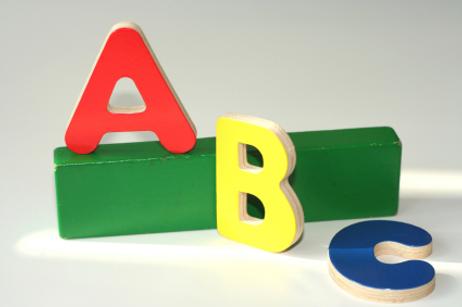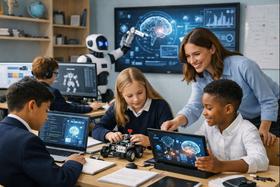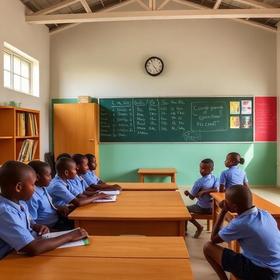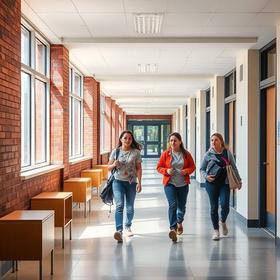What is a lab school? It is a K-12 school or school with some variation of those grades which typically is operated by a university or college. Sometimes it is called a demonstration school. A few lab schools are not affiliated with any institution of higher learning.
The school is a lab or laboratory school because teachers in training and the faculty of the college's education department usually have a hand in teaching and running the school. Like scientists experimenting in their labs, these educators use the lab school as their place to try out theories and methods. They also provide student teachers a controlled situation where they can learn the art of teaching.
Most lab schools are progressive schools as well. What are the differences between traditional and progressive schools? This chart from the Wingras School in Madison, Wisconsin illustrates the main differences. Lab schools adopt the progressive philosophy as part of their child-centric approach to education. The flexibility inherent in the progressive approach works well with student teachers who are just coming to grips with how children learn.
The list of schools which follows includes only private lab schools. Many state and public universities operate their lab schools in conjunction with the local school district. As such they do not charge tuition or charge very little tuition. The private lab schools do charge tuition.
A.E. Phillips Laboratory School, Ruston, LA
Grades: K-8
Program: "The school's purpose is to educate students in a wholesome, challenging environment that will develop competent, creative, confident, and caring individuals."
Baker Demonstration School, Wilmette, IL
Grades: N-8
Program: "Founded by progressive education pioneer, Clara Bell Baker, in 1918, Baker Demonstration School serves close to 400 toddlers through eighth-grade students."
Barbara K. Lipman Early Childhood School and Research Institute, Memphis, TN
Program: "At the Lipman School we believe that a person needs to be a lifelong learner. As the laboratory demonstration early childhood school for the College of Education of the University of Memphis, we implement a learning environment based in constructivist research."
Bernice M. Wright Child Development Laboratory School, Syracuse, NY
Grades: N-K
Program: "Serving a diverse group of children and their families, the school is operated by Syracuse University's College of Human Ecology, accredited by the National Association for the Education of Young Children (NAEYC), and licensed by New York State OCFS."
Burris Laboratory School, Muncie, IN
Grades: K-12
Program: Burris Laboratory School is a department of the Teachers' College of Ball State University. It "provides the development, demonstration, and dissemination of effective and innovative teaching practices, offers an exemplary pre-service clinical program for teaching majors, accommodates research and operates an educationally sound instructional program for its K-12 population."
Bank Street School For Children, New York, NY
Grades: N-8
Program: "The School for Children is an independent demonstration school for Bank Street College...Education at the School is experience-based, interdisciplinary, and collaborative. The emphasis is on educating the whole child -- the entire emotional, social, physical, and intellectual being -- while at the same time, the child's integrity as learner, teacher, and classmate is valued and reinforced."
Berry College Elementary School, Mount Berry, GA
Grades: K-8
Program: Berry was established with a Lilly Foundation grant in 1977. It offers "a challenging curriculum...structured to focus on application, exploration and learning through discovery in the areas of reading, writing, language arts, math, science, social studies, physical education, the fine arts, and Spanish."
The Campus School, Pittsburgh, PA
Grades: PK-8
Program: "The Campus School of Carlow University is an independent, coeducational, Catholic day school for Pre-Kindergarten through grade eight, and a Montessori Preschool program."
Falk Laboratory School, Pittsburgh, PA
Grades: K-8
Program: "The original charter designated the school as a progressive experimental school for demonstration purposes; however in 1946 the charter was amended to include practice teaching as one of the school's functions. Over the years the faculty added to the school's original functions the development of new innovative educational practices, the in-service
education of experienced teachers, and educational research."
Greenwood Laboratory School, Springfield, MO
Grades: K-12
Program: Technically a public school because it receives state funding, GLS is a private school in the sense that it charges tuition.
Henry Barnard School, Providence, RI
Grades: N-5
Program: "The primary purpose of Henry Barnard School is to provide an excellent educational opportunity for its students, while simultaneously functioning as a resource and learning center for Rhode Island College students."
Howard Gardner School for Discovery, Scranton, PA
Grades: PK-6
Program: "HGSD is a private, academic school that focuses on our learners and their strengths." It embraces the multiple intelligence theories of Dr. Howard Gardner.
Hunter College Campus Schools, New York, NY
Grades: K-12
Program: "The Hunter College Campus School is made up of Hunter College Elementary School (K-6) and Hunter College High School (7-12). Our schools strive to reflect the city they serve by admitting and educating a population of students who are culturally, socio-economically, and ethnically diverse. We seek to serve as a model for combining excellence and equity, serving as a catalyst for change in New York City and the nation. Our schools use the principles of gifted education, including depth, complexity, challenge, enrichment, and acceleration of the curriculum, to meet the needs of intellectually advanced students." Kilby Laboratory School, Florence, AL
Program: "The mission of Kilby Laboratory School is to provide a safe, stimulating, and cooperative learning environment that promotes cognitive development with an emphasis on thinking, reasoning, and problem-solving."
Mills College Children's School, Oakland, CA
Grades: N-5
Program: "The Children's School has a dual mission of training early childhood education professionals and providing quality education to infants, toddlers, preschoolers, and kindergarten-through-fifth-grade students."
Model Elementary Laboratory School, Richmond, KY
Grades: PK-12
Program: Established in 1906 the school is semi-private with modest tuition charged and strict limits on the number of students per grade level.
The Onica Prall Child Development Laboratory School, Frederick, MD
Grades: Preschool
Program: "The Onica Prall Child Development Laboratory School begun in 1929, is operated by the Department of Education of Hood College. The school provides preschool education for children who are three and four years old."
The School at Columbia University, New York, NY
Grades: K-8
Program: "One of the primary considerations of The School's educational program is that in the lower grades students first learn integrative habits of mind, which when they enter the upper grades of The School they naturally apply to more rigorously attended disciplines." The School for Young Children at Saint Joseph College, West Hartford, CT
Grades: PK
Program: "The School for Young Children provides two years of high-quality preschool experience for young children prior to their age of Kindergarten eligibility as defined by the State of Connecticut. "
The Skidmore Early Childhood Center, Saratoga Springs, NY
Grades: PK
Program: "The Skidmore Early Childhood Center is a laboratory school affiliated with the Education Department at Skidmore College."
Smith College Campus School, Northampton, MA
Grades: K-6
Program: "Founded in 1926, the Smith College Campus School is a coeducational day school enrolling students from Northampton and the surrounding communities in grades K through 6."
St. Martin Hall Child Development Center, San Antonio, TX
Grades: N-K
Program: "The Child Development Center serves as a laboratory site for OLLU School of Professional Studies, where OLLU students are involved in practicum assignments and classroom observations."
Starpoint School, Fort Worth, TX
Grades: 1-6
Program: "Starpoint School is a laboratory school for learning disabled students located on the Texas Christian University campus."
Wimpfheimer Nursery School, Poughkeepsie, NY
Grades: N-PK
Program: "The basic components of quality early childhood education are the cornerstones of Wimpfheimer Nursery School: a child-centered environment; a developmentally appropriate curriculum; low adult/child ratios; and an educated, experienced teaching staff."
Windy Hill School, New London, NH
Grades: N-K
Program: "Windy Hill School is an integral part of the college's Child Development Program, and, as such, offers special opportunities for the youngsters enrolled in our programs. The school has three distinct programs: Toddlers, Nursery School, and a Primary Program."
Questions? Contact us on Facebook. @privateschoolreview













